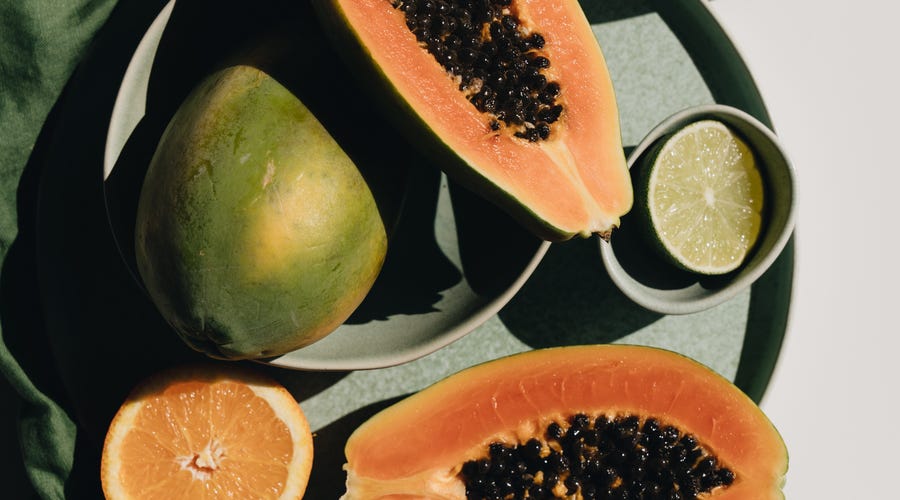
76 most delicious fruits to learn in German for a fruity vocab
Author: Marie Schmoll
As the weather gets warmer (even in Germany!), we’re getting in the mood for smoothies, sorbet and sweet desserts. So get ready for a portion of fresh fruits!
From “Zwetschge” to “Drachenfrucht” - Some fruits can be a mouthful in German - but a delicious one!
Whether you’re learning German to follow a German apple cake recipe or to order your favorite dessert on a summer vacation to a German-speaking country - now is the perfect time to boost your vocabulary and your immune system with this sweet list of fruits in German.

Free German fruits poster
Print out this free and fun fruits poster and stick it on your fridge. If you can memorize this list of some of the more popular fruits in German, you'll be on your way to sounding like a local.
List of fruits in German
The German word for fruit is “Frucht” [fʁʊxt], and its plural is “Früchte” [ˈfʁʏçtə]. Now, we’re not gonna lie. That’s one of the more difficult German words to pronounce. With the German “r”, followed by “u/ü” and “ch”, you might need a couple of tries to get it right.
Just make sure you master each of the sounds individually before you put them together. Our fun and fresh beginner's guide to learning the German alphabet can help with that.
Citrus fruits in German
Citrus trees don’t do well in colder climates. So Germany gets its citrus fruits primarily from Peru, Paraguay, Spain and Ghana. Oranges and tangerines are especially popular in the winter, while lime and lemon are perfect for fizzy drinks on hot summer days.

| English | German (Singular) | German (Plural) | IPA | Season |
|---|---|---|---|---|
| Amanatsu | Amanatsu | Amanatsu-Früchte | [amanatzʊ] | - |
| Bergamot | Bergamotte | Bergamotten | [bɛʁɡaˈmɔtə] | - |
| Grapefruit | Grapefruit | Grapefruits | [gʁapəfʁu:ɪt] | - |
| Lime | Limette | Limetten | [liˈmɛtə] | - |
| Imperial lemon | Kaiserzitrone | Kaiserzitronen | [ˈkaɪ̯zɐt͡siˈtʁoːnə] | - |
| Tangerine | Mandarine | Mandarinen | [ˌmandaˈʁiːnə] | - |
| Orange | Orange | Orangen | [oˈʁɑ̃ːʒə] | - |
| Pompelmous | Pampelmuse | Pampelmusen | [pamplmuːzə] | - |
| Pomelo | Pomelo | Pomelos | [po:me:lo:] | - |
| Bitter orange | Pomeranze; Bitterorange | Pomeranzen; Bitterorangen | [po:me:ʁant͡sə; bɪtɛɐ̯o:ʁaŋə] | - |
| Lemon | Zitrone | Zitronen | [t͡siˈtʁoːnə] | - |
Stone fruits in German (drupe fruits)
In spring and summer, you’ll find lots of stone fruits like mirabelles, plums and cherries, in German orchards and backyards. If you want to keep them around throughout the year, you can always turn them into delicious jams!
| English | German (Singular) | German (Plural) | IPA | Season |
|---|---|---|---|---|
| Mirabelle | Mirabelle | Mirabellen | [miʁaˈbɛlə] | July - September |
| Nectarine | Nektarine | Nektarinen | [nɛktaˈʁiːnə] | April - August |
| Peach | Pfirsich | Pfirsiche | [ˈp͡fɪʁzɪç] | July, August |
| Plum | Pflaume | Pflaumen | [ˈp͡flaʊ̯mə] | July - September |
| Greengage | Reneklode | Renekloden | [ʁenəˈkloːdə] | July - October |
| Damson | Zwetschge | Zwetschgen | [ˈt͡svɛt͡ʃɡə] | July - September |
| Apricot | Aprikose | Aprikosen | [ˌapʁiˈkoːzə] | June - August |
| Olive | Olive | Oliven | [oˈliːvə] | - |
| Sour cherry | Sauerkirsche | Sauerkirschen | [ˈzaʊ̯ɐˌkɪʁʃə] | July - August |
| Sweet cherry | Süßkirsche | Süßkirschen | [ˈzyːsˌkɪʁʃə] | June - August |
| Coconut | Kokosnuss | Kokosnüsse | [ˈkoːkɔsˌnʊs] | - |
Berries in German
Berries like it cool, which is why a large number of fruits that grow in Germany belong to this category. The more sun they get, the sweeter they taste. During the summer months, Germany has an abundance of strawberry and raspberry fields, many of which offer a “pick your own” option.
Nothing like spending some time in the sun, munching fresh fruits that you handpicked. So grab your sunhat and a basket!

| English | German (Singular) | German (Plural) | IPA | Season |
|---|---|---|---|---|
| Strawberry | Erdbeere | Erdbeeren | [ˈeːɐ̯tbeːʁə] | June - July |
| Raspberry | Himbeere | Himbeeren | [ˈhɪmˌbeːʁə] | June - September |
| Blueberry | Blaubeere | Blaubeeren | [ˈblaʊ̯ˌbeːʁə] | June - September |
| Blackberry | Brombeere | Brombeeren | [ˈbʁɔmˌbeːʁə] | June - September |
| Boysenberry | Boysenbeere | Boysenbeeren | [bo:ɔʏ̯zənbe:ʁə] | August - September |
| Elderberry | Holunderbeere | Holunderbeeren | [hoˈlʊndɐˌbeːʁə] | August - September |
| Grape | Weintraube | Weintrauben | [vaɪ̯ntʁaʊ̯bə] | - |
| Currant | Johannisbeere | Johannisbeeren | [joˈhanɪsˌbeːʁə] | June - August |
| Cloudberry | Moltebeere | Moltebeeren | [ˈmɔltəˌbeːʁə] | - |
| Juniper berry | Wacholderbeere | Wacholderbeeren | [vaxo:ldɐɐ̯be:ʁə] | October - November |
| Lingonberry | Preiselbeere | Preiselbeeren | [pʁaɪ̯zəlbe:ʁə] | August - October |
| Gooseberry | Stachelbeere | Stachelbeeren | [ˈʃtaxl̩ˌbeːʁə] | July - September |
| Cranberry | Cranberry, Mohnbeere | Cranberries, Mohnbeeren | [kʁanbɐʁi:] | - |
| Huckleberry | Heidelbeere | Heidelbeeren | [ˈhaɪ̯dl̩ˌbeːʁə] | June - September |
| Mulberry | Maulbeere | Maulbeeren | [ˈmaʊ̯lˌbeːʁə] | August - September |
Melon fruits in German
Most European melons come from Italy, Spain and southern France, but what a lot of people don’t know is that some melons grow in Germany, too, even though this may require good gardening skills and a greenhouse in some regions. The most popular ones are honeydews, watermelons, pineapples, and cantaloupe melons.
| English | German (Singular) | German (Plural) | IPA | Season |
|---|---|---|---|---|
| Muskmelon | Zuckermelone | Zuckermelonen | [t͡sʊkɐme:lo:nə] | - |
| Honeydew | Honigmelone | Honigmelonen | [ho:nɪçmɛlo:nə] | - |
| Pineapple melon | Ananasmelone | Ananasmelonen | [ananasme:lo:nə] | - |
| Netted melon | Netzmelone | Netzmelonen | [nɛt͡sme:lo:nə] | - |
| Cantaloupe melon | Cantaloupe-Melone | Cantaloupe-Melonen | [kantalu:pə me:lo:nə] | - |
| Watermelon | Wassermelone | Wassermelonen | [vasɐme:lo:nə] | - |
| Galia | Galia-Melone | Galia-Melonen | [galɪa: me:lo:nə] | - |
Tropical fruits in German
Tropical fruits are harvested in tropical and subtropical regions such as India, Thailand, Brazil and Mexico. Unfortunately, central Europe is too cold for them.

| English | German (Singular) | German (Plural) | IPA | Season |
|---|---|---|---|---|
| Acai | Acai-Beere | Acai-Beeren | [aˈsaɪ be:ʁə] | - |
| Pineapple | Ananas | Ananas | [ˈananas] | - |
| Avocado | Avocado | Avocados | [avo:ka:dɔ] | - |
| Banana | Banane | Bananen | [baˈnaːnə] | - |
| Date | Dattel | Datteln | [ˈdatl̩] | - |
| Dragonfruit | Drachenfrucht | Drachenfrüchte | [dʁaxənfʁu:xt] | |
| Fig | Feige | Feigen | [ˈfaɪ̯ɡə] | - |
| Goji-Beere | Gojibeere | Gojibeeren | [go:jɪbe:ʁə] | - |
| Guava | Guave | Guaven | [gʊavə] | - |
| Persimmon | Kaki; Dattelpflaume | Kakis; Dattelpflaumen | [ka:ki:; da:təlp͡flaʊ̯mə] | - |
| Kiwi | Kiwi | Kiwis | [ki:vɪ] | - |
| Lychee | Litschi | Litschis | [li:tʃɪ] | - |
| Mango | Mango | Mangos | [maŋɔ] | - |
| Papaya | Papaya | Papayas | [papaɪ̯a] | - |
| Tamarind | Tamarinde | Tamarinden | [tamaʁɪndə] | - |
Pome fruits in German
The apple is the most popular fruit throughout all of Germany, Austria and Switzerland.
80% of Germans state that they regularly eat apples!
Probably a healthy habit, considering the old saying that an apple a day keeps the doctor away.
| English | German (Singular) | German (Plural) | IPA | Season |
|---|---|---|---|---|
| Apple | Apfel | Äpfel | [ˈap͡fl̩] | August - October |
| Loquat | (Japanische) Wollmispel | (Japanische) Wollmispeln | [japa:nɪʃə vɔlmɪʃpəl] | February - May |
| Medlar | Mispel | Mispeln | [mɪʃpəl] | August - October |
| Pear | Birne | Birnen | [bɪɐ̯nə] | September - December |
| Quince | Quitte | Quitten | [kvɪtə] | September - November |
| Rowan | Vogelbeere | Vogelbeeren | [fo:gəlbe:ʁə] | August - October |
Nuts in German
They might not be as refreshing as the others, but nuts also count as fruits - and they’re some of the healthiest ones, as they’re a great source of protein, vitamins and minerals.

| English | German (Singular) | German (Plural) | IPA | Season |
|---|---|---|---|---|
| Cashew nut | Cashewnuss | Cashewnüsse | [ka:shɛnʊs] | - |
| Peanut | Erdnuss | Erdnüsse | [ɛɐ̯tnʊs] | - |
| Sweet chestnut | Esskastanie, Marone | Esskastanien, Maronen | [ɛskasˈtaːni̯ə; maˈʁoːnə] | September - November |
| Hazelnut | Haselnuss | Haselnüsse | [ha:zəlnʊs] | September - October |
| Macadamia nut | Macadamianuss | Macadamianüsse | [makaˈdaːmi̯aˌnʊs] | - |
| Almond | Mandel | Mandeln | [ˈmandl̩] | - |
| Brazil nut | Paranuss | Paranüsse | [ˈpaːʁaˌnʊs] | - |
| Pecan | Pekannuss | Pekannüsse | [ˈpeːkanˌnʊs] | - |
| Pistachio | Pistazie | Pistazien | [pɪsˈtaːt͡si̯ə] | - |
| Walnut | Walnuss | Walnüsse | [ˈvalˌnʊs] | - |
| Water nut | Wassernuss | Wassernüsse | [vasɐnʊs] | - |
Fruity German idioms
The German language includes countless idioms that involve fruits, especially those that are native to Germany. If someone is unpleasant to be around it’s “nicht gut Kirschen essen” or “no fun eating cherries” with them.
You might go so far as to call them a “Pflaume” (Plum) in German but sometimes you just gotta do something you don’t want to do or as the Germans say “in den sauren Apfel beißen” or “to bite into the sour apple”.
Tips for learning the names of fruits in German
The list of fruits is long and it can be boring to just learn them by heart one by one. Here are some ideas to make learning more fun.
1. Watch baking videos in German
Youtube is a great source for baking videos. Look up German recipes for fruit cakes or other fruity desserts and practice your language skills, while you sit back and let the others do the baking.
2. Involve your senses
After finding the right inspiration, it’s time to pick a dessert and make it yourself, while repeating the fruit-related words. You’re more likely to learn new words when you involve your whole body.
3. Learn a German song involving fruits
Learn from the fruits themselves - with this cute German song. Listen to the different fruits introduce themselves and tell their stories - perfect for kids AND YOU!
Das Obstlied - Kinderlieder zum mitsingen - Obst lernen - german fruit song
Fruit shopping at a market or supermarket in Germany
When you’re fruit shopping in Germany, remember to bring your own bag. Germans care about the environment and usually charge for plastic bags. When you’re ordering fruits from a vendor, simply say “Ich hätte gern” (I’d like to have) and add the number or the weight (“Gramm” or Kilo”).

| English | German |
|---|---|
| I’d like to order three bananas, please. | Ich hätte gern drei Bananen, bitte. |
| I’d like to order 100 grams of almonds, please. | Ich hätte gern 100 Gramm Mandeln, bitte. |
Eventually, remember to say thank you and goodbye!
Sweeten up your language learning experience
No need to make learning German feel like you’re biting into a sour apple! Sweeten up the experience with our tips and remember to have fun with it. Just like planting a fruit tree, learning a language takes time.
Showing up to class and putting in the work is like sowing the seeds, and when you’re able to have your first conversation with a native speaker or you manage to order the right amount of almonds at the supermarket by yourself, you’ll feel like harvesting the sweet fruits of your labor and realize that it was worth it!
If you’re finding these blog article lessons fun and peachy, keep enjoying the German language ride on our free learn German vocabulary blog.



